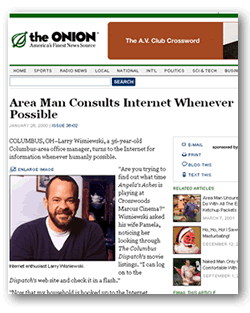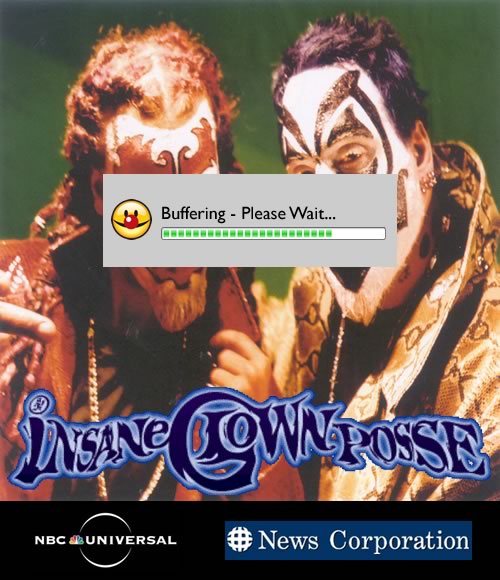 Those of you who’ve been following my personal blog, The Adventures of Accordion Guy in the 21st Century, might recall a posting from way back in 2004 in which I wrote about my appearance in an article in the Globe and Mail titled Net Diarists Blog Their Way to a Job. The article also covered how the blogs helped the charming, telegenic and tech-savvy Amber Macarthur land her job. For reasons I will never fathom (but for which I am grateful), they used my picture for the article instead of hers.
Those of you who’ve been following my personal blog, The Adventures of Accordion Guy in the 21st Century, might recall a posting from way back in 2004 in which I wrote about my appearance in an article in the Globe and Mail titled Net Diarists Blog Their Way to a Job. The article also covered how the blogs helped the charming, telegenic and tech-savvy Amber Macarthur land her job. For reasons I will never fathom (but for which I am grateful), they used my picture for the article instead of hers.
The general gist of that article from a couple of years ago was that having a blog can help build your presence on the web, which in turn can help get you a job. Today, a ComputerWorld article posted today takes it to the next step: it says that not having a web presence can actually hurt your job search.
In a 2006 survey by executive search firm ExecuNet in Norwalk, Conn., 77 of 100 recruiters said they use search engines to check out job candidates. In a CareerBuilder.com survey of 1,150 hiring managers last year, one in four said they use Internet search engines to research potential employees. One in 10 said they also use social networking sites to screen candidates. In fact, according to Search Engine Watch, there are 25 million to 50 million proper-name searches performed each day.
In today’s job market, turning up missing on the Web may not be a fatal flaw, and it’s probably better than having a search result in a photo of you in a hula skirt. But over time, the lack of a Web presence — particularly for IT professionals — may well turn from a neutral to a negative, says Tim Bray, director of Web technologies at Sun Microsystems Inc.
“Particularly because we’re a core technology provider, if someone came looking for a senior-level job and had left no mark on the Internet, I’d see that as a big negative,” he says.
The article provides these tips for boosting your presence on the web:
- Know where people look. Do a “vanity search” on your name on search engines and blog search tools like Technorati. See what the first three to five pages of results have to say about you.
- Start a blog. Blogs, when used well are SEO goldmines as they often are:
- Heavy on the text
- Rich in links
- Updated often
- Well-formatted (from an HTML point of view)
- Join the open source community.
- Build a web page.
- Create a web profile.
Andy Beal added another four tips to the list:
- Buy your domain name. “Even if you don’t do a lot with it, you should own a domain name that matches (as close as possible) your name. Your online brand is important, and guess what, despite how many employers you may ultimately have, you’ll likely keep that same name for life!”
- Understand your Google profile. “Most potential employers are going to use Google, so you may as well focus on the search results there. What’s being said about you, what pages are indexed? Don’t just look at stuff that is about you, look at listings that are about someone with the same name, yet maybe negative. You should be prepared to explain that the person convicted for 3 counts of armed robbery, is not actually you.”
- Own your brand. “When someone searches for your name, you should try and make sure you have as much control over what they see, as possible. Set up a Flickr account, LinkedIn profile, blog, user-group profile, etc.”
- Destroy the evidence. Ok, so while most stuff you put online is there for eternity, that doesn’t mean you can’t try some damage control. “That blog post you uploaded – the one where you went on an all night drinking binge and broke into the local Krispy Kreme – remove it! While it may still exist somewhere on the web, it is less likely to show up in the Google search results, if you’ve removed it from your own blog/social network.”
Andy also points to an article of his from last year that might come in handy: Online Reputation Monitoring & Management Beginners Guide.




 Isn’t that just like a clown: bringing a TV to an internet fight. The two key messages being pushed by Clown Chernin and Clown Zucker were “respecting copyright” and “creating the largest advertising platform on earth”. Arrington nails it with his comment: “That may be good messaging to stockholders, but it isn’t what the public cares about.”
Isn’t that just like a clown: bringing a TV to an internet fight. The two key messages being pushed by Clown Chernin and Clown Zucker were “respecting copyright” and “creating the largest advertising platform on earth”. Arrington nails it with his comment: “That may be good messaging to stockholders, but it isn’t what the public cares about.”